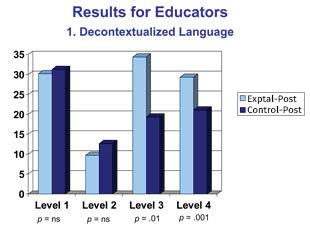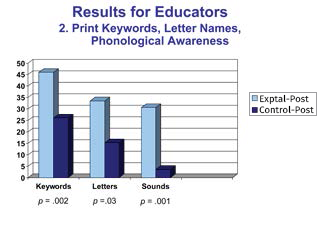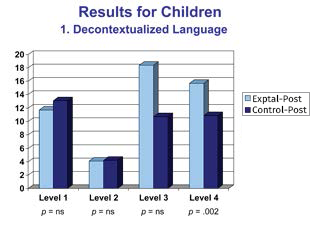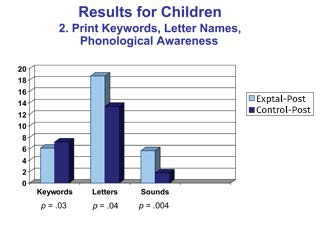ABC and Beyond™ Study 1
Facilitating Emergent Literacy: Efficacy of a Model That Partners Speech-Language Pathologists and Educators
(Girolametto et al., 2012)
In 2012, a research study was published that described the efficacy of the ABC and Beyond Program (Girolametto et al., 2012). The study's aims were to determine:
- whether educators learned to apply the literacy-promoting strategies they learned during the ABC and Beyond Program
- whether the children's early literacy skills improved as a result of educators learning to apply the strategies if, in fact, application occurred
Study Design
A randomized controlled trial design was used to assess the impact of the ABC and Beyond Program on educators' ability to use literacy promoting strategies and the subsequent effect on the children's literacy skills.
The subjects consisted of early childhood educators and the children they worked with in their child care centres.
Educators
- 20 educators comprised the sample group
- All educators were female, had a diploma or degree in early childhood education and at least two years of teaching experience.
- All educators were randomly assigned to the experimental or control group (10 and 10)
- The experimental group attended the ABC and Beyond Program
The control group received no training (they participated in the ABC and Beyond program once the study was complete).
Children
- 76 preschool children (34 boys and 42 girls)
- All of the children were between 44 and 69 months of age
- All of the children were typically developing
76.3% of the children were in subsidized child care spaces, suggesting that many came from families facing economic challenges – a factor that can sometimes impact oral language and literacy development.
Measures and Research Questions
The research involved pre- and post-test video recordings of teachers interacting with the children. The data from the recordings was then coded and analyzed with regard to the following study questions below:
- Meaning-related study questions
- Did ABC and Beyond increase educators' use of abstract language during interactive storybook reading?
- Did the children increase their responses to educators' abstract language?
- Code-related study questions
- Did educators use more print referencing keywords (such as "spell," "letter," "write" etc.), letter names and references to the sounds letters make during storybook reading and a post-story craft activity?
- Did children increase their responses to educators’ use of print referencing keywords, letter names and letter sounds?
Results
The speech (utterances) of the educators and children were categorized into four levels of abstraction.
Level 1
Basic and simple comments or questions which referred to colour, size, one element in the picture or story, including labeling objects, actions, characters, colors, or object locations (e.g., "It's a bird."; "That's red"; "What's the boy doing?"; "Where's the cat?").
Level 2
Comments or questions that link two objects or actions in a picture (e.g., "The boy is on the chair"; "What are the cat and mouse doing?"). This includes utterances that provided general descriptions of a scene (e.g., "They are fighting over the bone").
Level 3
More abstract comments or questions that link the events or actions in a story to events or actions from the children's experiences. These introduce elements from outside of the picture into a conversation about the story (e.g., "Have you ever been scared of falling?"; "I like my hot dog with mustard on it"). Level 3 includes comments or questions that refer to the characters' feelings, the children's emotions and word definitions.
Level 4
The highest level of abstraction - i.e., the use of language to imagine, infer, predict, explain, project etc. (e.g., "Do you think the girl is misbehaving?"; "What's going to happen next?'; "What would happen if...?"; "Imagine what would happen if she ate that?"; "She's angry because she has to go to bed").
Educators’ Results
Abstract Language
Educators in the experimental group increased their use of abstract language -- also called decontextualized language. Post-program, there were minimal differences in the educators' use of low-level (Level 1 and 2) comments and questions. As expected, the experimental group used significantly more Level 3 and 4 utterances that better support the development of abstract language in young children.

Educators in the experimental group used significantly more print-related key words and references to letter names than the control group. The educators in the experimental group also made more references to sounds in words (e.g. "Sock starts with the 'ssss' sound"), an important component of phonological awareness.

Children's Results
The children's results mirrored those of their educators. As educators' use of abstract language, letter names and references to sounds in words increased, so too did the children's. The children's Level 4 utterances showed a significant increase in comparison to the control group, demonstrating that children can use highly abstract language, but only when they are exposed to it in conversation.


Discussion
This research demonstrates that ABC and Beyond is effective in increasing educators’ use of strategies which promote children's emergent literacy skills.
Compared to the control group, the educators in the experimental group demonstrated significant increases in the following areas:
- Use of abstract language (also known as decontextualized language)
- References to print concepts – i.e. use of words that "talk" about print, e.g. "read," "spell," "word," "letter"
- References to names of the letters of the alphabet – to build alphabet knowledge
- References to the sounds that make up words - to build phonological awareness (e.g. – “man" starts with the "mmmm" sound)
The most striking finding is that, when children are engaged in interactions in which they are exposed to models of abstract language and to references to letter names and sounds, they learn to use these skills themselves. Conversely, if they do not gain this exposure, they do not spontaneously use these skills.
While it is not possible to determine which specific aspects of the ABC and Beyond Program are associated with positive changes in educators’ and children’s literacy behaviours, it appears that the program's explicit focus on emergent literacy, its intensive nature and the inclusion of video feedback sessions are important contributors to the efficacy of this program. The results of the study confirm the importance of educators as primary change agents, and of the focus of the intervention as occurring within the context of everyday caregiver-child interactions.
